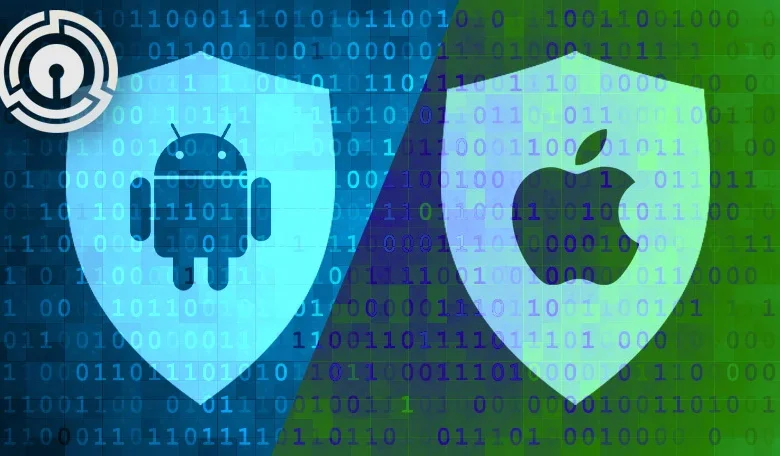IPhone and Android Security Features

When it comes to Are iPhones more secure than Android phones? The first thing we need to look at is their security features. Both iPhones and Android phones come with security measures like encryption app permissions and regular updates. However iPhones are known for their strong emphasis on privacy and security. Apple has created a system where users’ data is tightly controlled with features like Secure Enclave for storing sensitive data and a constant focus on user privacy. Every iPhone comes with a feature called Face ID which uses your face to unlock the phone making it difficult for others to access your phone.
On the other hand Android phones come in various models from different manufacturers so their security features may vary. Google provides Android phones with basic security features like Google Play Protect which scans apps for malicious activity. However not all Android phones get regular updates as quickly as iPhones. Some Android devices may not get the latest security patches leaving them vulnerable to attacks. Therefore the security of an Android phone can depend on the brand and how quickly the manufacturer releases software updates.
Operating System Architecture: iOS vs. Android
The question: Are iPhones more secure than Android phones? can also be answered by understanding the operating systems behind them: iOS and Android. iPhones run on iOS, an operating system developed by Apple. iOS is a closed system meaning Apple controls everything about how apps work and how they interact with the phone. This helps prevent malicious software from causing damage to your phone. Apple’s tight control over the system also ensures that apps must meet strict standards before they are allowed in the App Store.
Android on the other hand is an open-source system. This means that Google allows other companies to use Android and even modify it. While this gives users more freedom to customize their phones it can also make Android phones more vulnerable to attacks. Since manufacturers can alter the operating system some Android phones might not have the same level of security features that others do. As a result security can vary greatly between different Android models which makes it harder to guarantee the same level of protection across the board.
App Store Security: The Role of App Approval Processes
When we ask Are iPhones more secure than Android phones? the app store security plays a big role. Apple’s App Store is known for its strict review process. Every app submitted to the App Store is reviewed by Apple’s team before it is allowed on your iPhone. This means that the chances of downloading an app with malware or harmful software are very low. Apple also requires developers to follow certain guidelines which helps keep your data safe and private. As a result users can feel more confident when they download apps from the App Store.
On the other hand Android’s Google Play Store is more open and developers don’t face as strict of a review process as they do on iOS. While Google does have automated tools that scan for malware Android users may still face risks because apps are allowed to be downloaded from third-party sources. This increases the chances of downloading harmful apps that may compromise the phone’s security. For Android users it is important to be cautious about which apps they install and whether they are coming from trusted sources as the open nature of the Android system allows for more potential risks.
Software Updates and Security Patches: How Both Platforms Handle Them
One major factor in the debate of Are iPhones more secure than Android phones? is how software updates and security patches are handled. iPhones are known for their fast and regular updates. Apple releases iOS updates for all supported devices at the same time which means that every iPhone gets the latest security patches and bug fixes quickly. This ensures that users are protected from the latest security threats. Apple also supports older devices for many years meaning that even if you have an older iPhone you’re still receiving important updates to keep your phone safe.
Android updates on the other hand are less predictable. While Google releases updates for Android it’s up to the phone manufacturers to distribute these updates to their devices. This can cause delays and many Android users may not receive updates as quickly as iPhone users. Some Android phones, especially those from smaller manufacturers may not receive updates at all. This can leave users exposed to security vulnerabilities for longer periods of time. In terms of security regular and timely software updates are critical and iPhones generally have an edge over Android phones in this area.
Privacy Features: Apple’s Focus on User Privacy
Apple has always placed a strong emphasis on privacy and when we consider Are iPhones more secure than Android phones? their privacy features cannot be overlooked. iPhones come with several built-in privacy features to ensure that user data stays private. Apple’s privacy policies are designed to protect users from unwanted tracking and the company has made it clear that they don’t sell user data to advertisers. One feature App Tracking Transparency gives users control over which apps can track their activity across other websites and apps. This gives iPhone users more control over their personal information and prevents companies from exploiting their data.
Android on the other hand does offer privacy features but they may not be as comprehensive or as easy to use. Google has made changes to improve privacy in recent years such as giving users more control over location tracking but the Android system still collects more data compared to Apple’s approach. Google’s business model relies heavily on collecting user data for advertising purposes. While Android phones have made progress in terms of privacy Apple’s strict privacy stance generally gives iPhones an advantage when it comes to keeping your information private.
The Role of Third-Party Apps in Android Security
When considering Are iPhones more secure than Android phones? The role of third-party apps is a significant factor. In the Android ecosystem users can download apps from various sources, not just the Google Play Store. While this offers more freedom and flexibility it also increases the risk of installing malicious software. Apps downloaded from third-party websites may not be checked by Google for safety which can lead to security issues. Even if you stick to the Google Play Store there’s still a chance that harmful apps can slip through the cracks due to the less strict approval process.
iPhones however have a more controlled environment. Since Apple only allows apps to be downloaded from the App Store and the review process is strict it’s less likely that malicious apps will make their way onto an iPhone. Apple’s App Store has a much lower chance of containing harmful apps so users can trust that apps they download are more likely to be safe. Overall the risks posed by third-party apps are higher on Android making iPhones the safer choice in this area.
Biometric Authentication: iPhone’s Face ID vs. Android’s Fingerprint Sensors
Another important question when discussing Are iPhones more secure than Android phones? is how the biometric authentication systems compare. Apple’s iPhones use Face ID, a facial recognition system that unlocks the phone by scanning the user’s face. Face ID is considered highly secure as it uses advanced technology to create a 3D map of your face. The system can even detect if you are looking directly at the phone making it very difficult for someone to unlock the phone without your knowledge. iPhones also have a secondary security feature Touch ID which uses your fingerprint for authentication.
Android phones on the other hand often use fingerprint sensors for biometric authentication. While fingerprint sensors are generally secure they may not be as reliable or as advanced as Face ID. Some Android phones use facial recognition but it tends to be less secure compared to Apple’s system. In many cases Android devices also offer alternative methods like PIN codes or patterns but these can be less secure than biometric options. Overall the advanced Face ID system on iPhones gives them a slight edge over most Android phones when it comes to biometric security.
The Impact of Malware and Viruses on iOS and Android
Lastly when we ask Are iPhones more secure than Android phones? We must consider the impact of malware and viruses. iPhones are generally less susceptible to malware and viruses because of Apple’s closed system and the strict app approval process. Although iPhones are not immune to security threats they are less likely to encounter malware from third-party sources. Apple’s control over the App Store and the operating system reduces the likelihood of malicious software affecting the device.
Android phones however are more vulnerable to malware and viruses. Because Android allows apps to be downloaded from multiple sources including third-party websites the chances of installing harmful apps are higher. Malware and viruses can often infect Android phones through unsafe apps and since many Android phones don’t receive updates as regularly as iPhones the risk is even greater. While Google Play Protect scans for harmful apps it’s not foolproof. As a result Android users need to be more cautious about the apps they install and where they get them from.
Conclusion
When we ask Are iPhones more secure than Android phones? The answer is generally yes but it depends on how you use your phone. iPhones are typically more secure due to their closed system regular updates and strict app store policies. However Android phones can still be secure with the right precautions such as downloading apps from trusted sources and keeping the phone updated. Both platforms offer security features but iPhones tend to have the edge in terms of protecting your data and privacy. Ultimately the security of any phone relies on the user’s actions and awareness.

